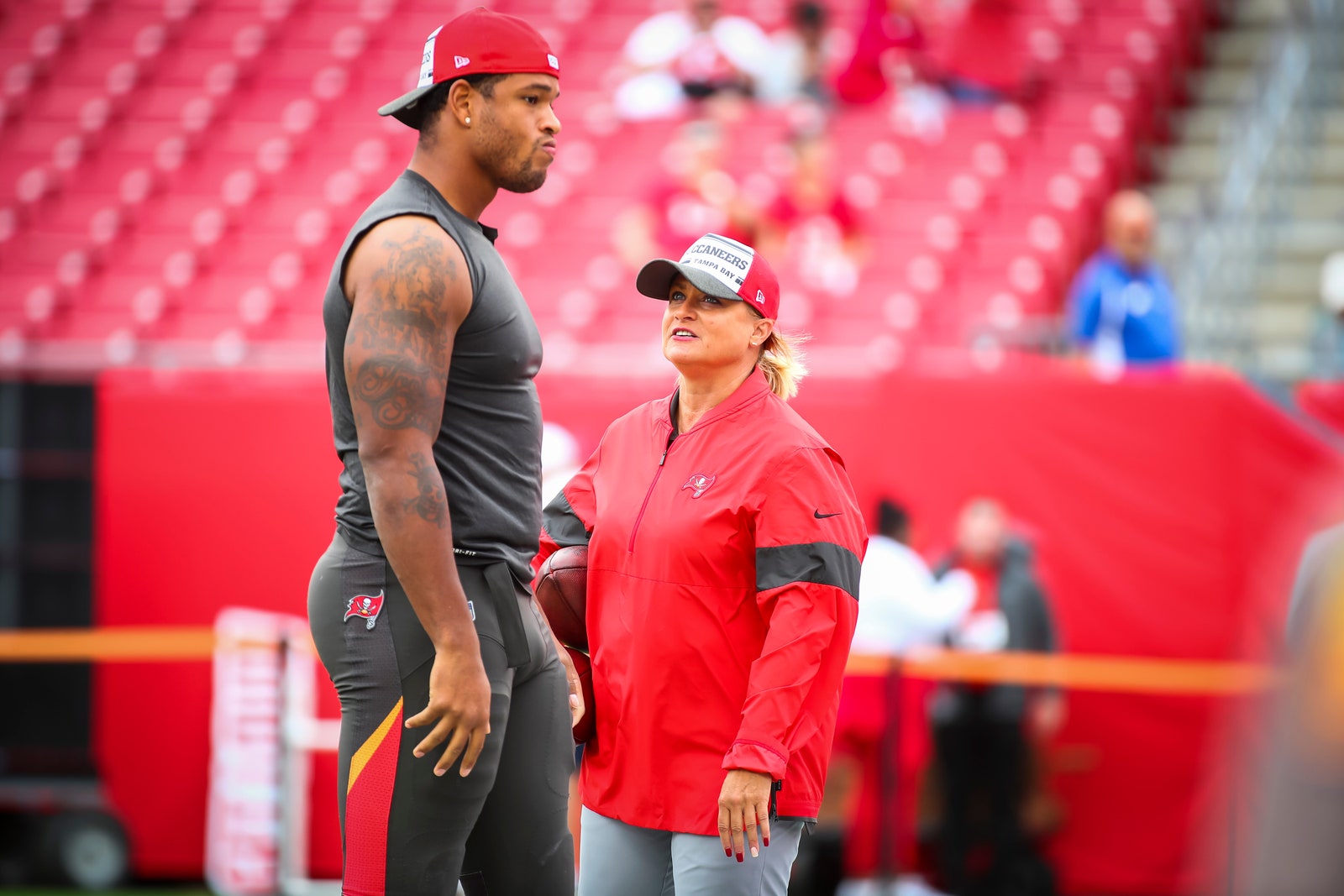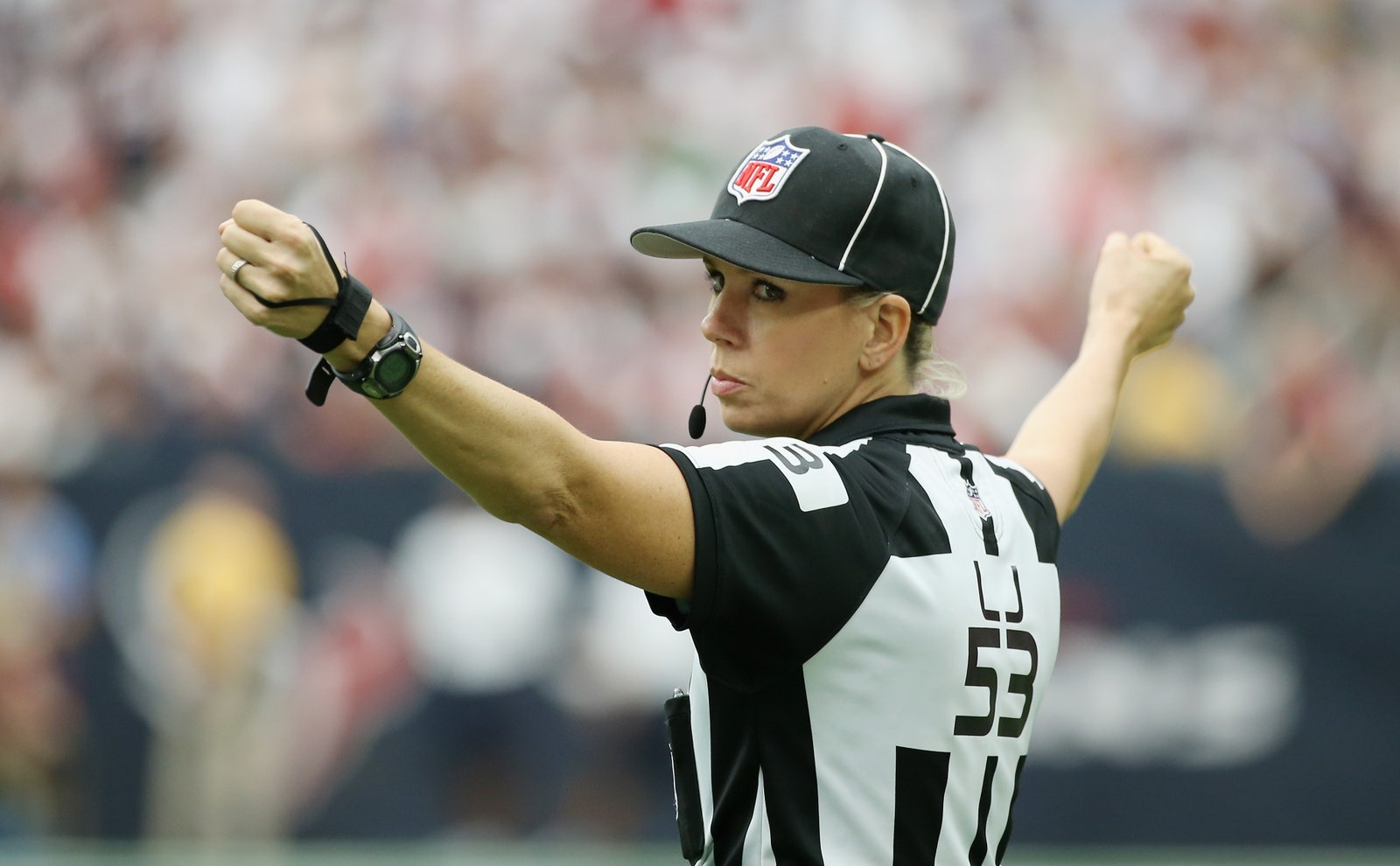It doesn’t matter who takes home the trophy on Sunday—the Big Game is already a record for women in sports.

Women Already Won the Super Bowl
Despite the pandemic, this year’s Super Bowl will look largely the same as the 54 that have come before it. There will be snacks. There will be Super Bowl commercials. There will be Tom Brady. But it will also have something infinitely more historic: a record number of women on the field.
The NFL—and men’s major league sports in general—have a serious woman problem when it comes to leadership positions. Despite the number of qualified women in sports, you can count the number of female coaches, commissioners, and franchise owners in men’s big league sports using your hands. But that’s changing—in the past year Katie Sowers became the first woman to ever coach in the Super Bowl; Jeanie Buss became the first female team owner to bring home an NBA championship and Becky Hammon became the first woman to ever serve as head coach in an NBA game; Kim Ng became the first woman ever named general manager of an MLB team and Bianca Smith became the first Black woman to coach a minor league team; and in the NHL, Dawn Braid became the first woman to get a full-time coaching gig.
When the Tampa Bay Buccaneers and the Kansas City Chiefs face off on Sunday, February 7—after Amanda Gorman, the inimitable youth poet laureate from the inauguration (and former Glamour College Woman of the Year) reads a poem as part of the preshow—a record three women will be on the sidelines in the biggest game in football: Lori Locust, assistant defensive line coach for the Buccaneers, Maral Javadifar, assistant strength and conditioning coach for the Buccaneers, and NFL official Sarah Thomas.
Tampa Bay Buccaneers’ Lori Locust with player O.J. Howard
Will Vragovic / Getty ImagesLocust—Coach Lo—was obsessed with football ever since she was a little kid, but with no girls teams, she didn’t a chance to play until she was 40, when a women’s exhibition team came to her area. “I got hurt playing in the women’s league, and I couldn’t stand to be away from the games, so I was asked to help coach. That turned a page for me,” Locust says. She paid her dues for years, starting with a high school coaching job and working her way up to semi-pro men’s teams and arena football. Finally she got an internship with the Baltimore Ravens—which would mean taking six weeks away from her full-time day job and from her two sons. “As a 56-year-old woman, I was doing things that guys in their 20s had to do to break into coaching,” she says. Two weeks before she was scheduled to start the coaching gig, she was fired from her job. “When I came back, I had no job. I had no benefits. It was a very scary time,” she says. “But you know, you act on faith, you call your contacts, you stay in touch with people who have a hand in hearing when there’s opportunity.” A few months later the call from Tampa Bay came.
AdvertisementLocust is one of two female coaches for Tampa Bay—the most in the league. She’s joined by Maral Javadifar, assistant strength and conditioning coach, who holds a Ph.D. in physical therapy. “I do look forward to the day that it’s no longer newsworthy to be a woman working in the Pros.… I hope we get to a point where all people are afforded equal opportunities to work in professional sports because there are a lot of great qualified coaches out there—it doesn’t matter your gender, your race, your ethnicity,” Javadifar said in a press conference ahead of the game. “I’m proud to work for a head coach like Bruce Arians and be part of an organization like the Tampa Bay Buccaneers where gender, race, ethnicity, it doesn’t matter—they’re looking to hire a qualified person.”
https://twitter.com/CarmieV/status/1356667721925156865Sarah Thomas will also be making history as the first woman to serve as an official in a Super Bowl. “I have a precious little girl that is watching her mom,” Thomas said in an NFL video about the first. “I never set out to be the first in any of this, but I know the impact I am having not just on my daughter but young girls everywhere, women everywhere. When I get on that field, and I take it all in, I know I’m probably going to get a little teary-eyed.”
This feels like a turning point for women in football—and hopefully for women in all sports. “It’s credit to the women that have been out there working so super hard to earn those positions and being ready to step into those [high-profile] roles, as opposed to people just saying, ‘Oh, it’s so cool to have a woman coach now, we want one too,’” says Locust. “If COVID hadn’t happened, I think you would have seen five more women in the league this year.”
While barrier breakers like Locust, Javadifar, and Thomas are laying the groundwork for women to have solid career pipeline in men’s major league sports, Nike is working to make sure there’s a pipeline of women ready to step into those roles. Ahead of the historic game, the brand announced a $5 million girls flag football grant in partnership with the NFL, which aims to grow a new generation of women athletes by supporting girls high school teams with gear donations and an online training hub. Currently, 1 million fewer girls participate in high school sports than boys. That has nothing to do with lack of skill or enthusiasm or drive—that gap is due solely to football, according to the National Federation of High School Associations.
“I wanted to play baseball because all my friends played baseball when I was a kid. And I can remember my mom and I walked to the door of the building to sign up and they wouldn’t even let us in,” Locust says. “That stuck with me. I felt at nine years old that wasn’t right.” The girls and women who will be watching Sunday’s game will be doing so facing a very different set of opportunities. But as Locust reminds us, “you can never let your foot off the gas.”
Macaela MacKenzie is a senior editor at Glamour. Follow her on Instagram and Twitter.
This story originally appeared on: Glamour - Author:Macaela MacKenzie






























